With almost everyone having access to the internet, ecommerce is beginning to overtake in-person shopping. The numbers speak for themselves – the global ecommerce market is estimated to exceed $17 trillion in a decade, with US sales doubling in the same timeframe. Everyone will want a piece of that pie!
Thus, to have a successful ecommerce store, you must stand out. You need to optimize the customer journey, manage your customers effectively, and scale your business accordingly. While this is easy for big retailers, your resources are limited. That’s where ecommerce integrations can help you streamline, automate, and scale your business.
But what are the best ecommerce integrations? That’s what we’ll find out in this article. To start, let’s cover some of the basics of these integrations and discuss their benefits for your store.
Jump ahead to:
- What is an Ecommerce Integration?
- What are the Benefits of Ecommerce Integrations?
- The 27 Best Ecommerce Integrations: 4 Website Builders
- 4 Payment Gateways
- 4 Customer Support Integrations
- 5 Email Marketing Integrations
- 5 CRM Tools
- 5 Shipping/Fulfillment Integrations
- How to Find the Best Ecommerce Integrations for Your Business
- Scale Your Ecommerce Business with Whop!
What is an Ecommerce Integration?
Ecommerce integration is the collection and connection of all your online store’s data with back-end software. With integrations, you can gather information from the front end (website) and automatically redistribute it to the designated back-end tool (e.g., customer data → CRM software).
Let’s say you want to process payments on your store's checkout page instead of redirecting your customer to your payment processor’s page. You’ll need a payment gateway integration, like Stripe, to do so. Or, if you have an inventory management integration, you can automatically order new stock when an item is sold out.
As we’ll see below, ecommerce integrations help you run your online shop more efficiently and keep your customers happy. The key is finding a platform, like Whop, which has integrations with several apps so that you can optimize your store as much as possible.
What are the Benefits of Ecommerce Integrations?
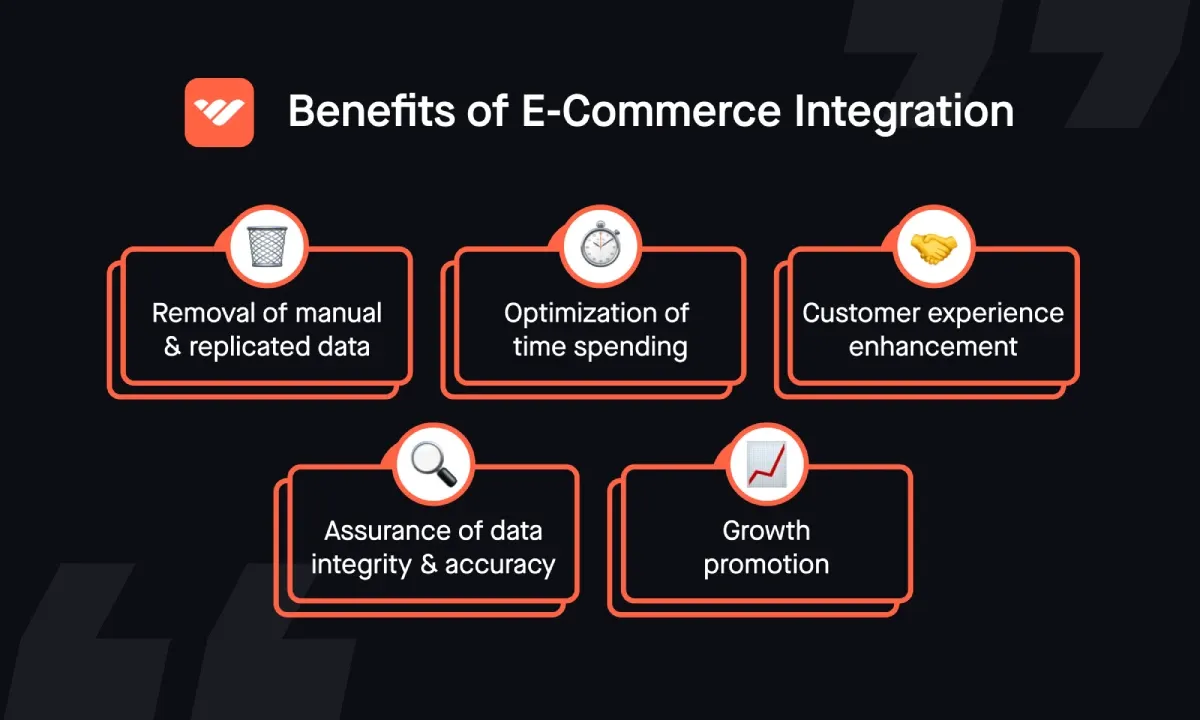
We’ve already discussed some of the many benefits of integrations, from automation to customer satisfaction. But let’s dive into these positives to see what you’ll need to look for when choosing one.
Increased Functionalities
Well, this is pretty self-explanatory, but it should be mentioned nevertheless. Ecommerce integrations come with more functionalities for your platform. These new features will help your online store grow and allow you to scale it further.
For instance, let’s say you add a Stripe integration to your checkout process. Your customers will be able to pay directly on your site, and they won’t have to worry about security since Stripe is well-known for its security measures.
Another example would be adding a live chat through a customer support integration. A good customer experience will make your customers repeat buyers, and customer support plays a key role throughout the buyer journey.
The same goes for every ecom integration. All of them have different features that are added to your core store, which will make your business stand out and increase sales.
Automated Business Processes

Another benefit of integrations is the automation they bring. When you’re starting your ecommerce store, saving manual labor will inevitably result in you having more time, thus allowing you to scale your business.
With ecommerce integration like email marketing, you can automatically send product alerts to leads or exclusive offers to existing customers. The same goes for CRM tools, like Whop, which allow you to automatically get all the customer data you need.
In turn, you’ll be able to scale your store when starting out and make all business processes faster and smoother in the long run.
Streamlined Buyer Journey
Now, when you use all the necessary integrations for your store, you can streamline the buyer journey across all stages. CRM integrations will work their magic here, but you’ll also need other tools to help out, like a payment gateway, customer support, etc.
The main benefit of all these integrations is that you can make the buyer journey seamless from when your customers become aware of your store to retaining them after they’ve made a purchase. It’s all about presenting them with the right offer, the right pop-up, according to the data you’ve got from the time they’ve spent on your online store.
To put it simply, having a good CX will make your store memorable, while using email marketing integrations will further make your brand stand out. If you choose the right shipping integration and keep your customers informed throughout the process, they’ll happily buy another product from you down the line. It’s all about keeping your customers happy.
Speaking of which…
Enhanced Customer Satisfaction

Integrations are there to scale your online store and ensure your customers have the best experience. Here’s the deal: when a shopper has the smoothest, most effortless, and most seamless buying experience on your online store, they’ll pick you over the competition.
For example, if your website has a simple but intuitive UI, it’ll be easy for them to find exactly what they’re looking for from the get-go. Or, if you have top-notch customer support through live chat, they’re more likely to buy from you than choosing a competitor. Basically, integrations are there to make customer service even better.
Ultimately, if your customer buys your product and has a fun experience while doing so, they’ll become a repeat customer. When you use email marketing integration, you can ensure that they’ll buy from you again by automatically sending them notifications about similar new products.
With all this in mind, let’s get straight into our list of the best integrations for your ecommerce store.
The 27 Best Ecommerce Integrations: 4 Website Builders
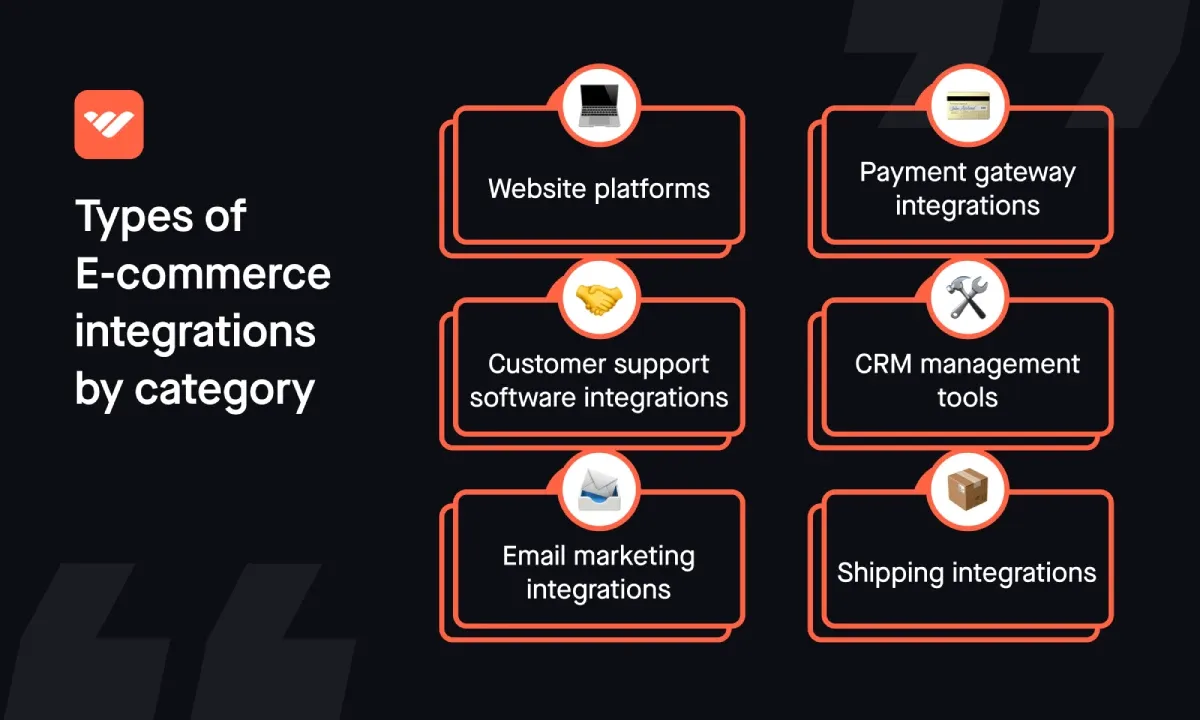
We’re starting off with something that’s not exactly an integration: website builders or ecommerce platforms. You see, these are the core of all your data integrations, so you’ll need to pick one with plenty of integrations with different apps.
We’ve specifically chosen 4 website builders that are used to make ecommerce stores instead of more general drag-and-drop builders like Squarespace. That’s because many of these already have built-in features you’d otherwise need an integration for, like inventory management or payment gateways.
1. 🏅Shopify

When it comes to ecommerce sites, Shopify is hands down the most popular one. While it’s not the leading platform (that title goes to WooCommerce, as we’ll see below), some of the biggest companies, like Gymshark, choose Shopify for their ecommerce store.
The reason is simple. The platform has tons of built-in tools, from email marketing to shipment and fulfillment, and even its own payment gateway and point-of-sale (POS) system. On top of that, Shopify has integrations with thousands of apps, allowing you to streamline your store even more.
Since the platform is so intuitive, it can be used by both solopreneurs and big ecommerce chains. So, if you’re selling physical products, Shopify is one of your best options.
Pricing: Shopify has three pricing plans. They all start with a free trial, and the first month is charged at $1. From then on, you can pay monthly or yearly, the latter having a 25% discount. The plans are as follows:
- Basic plan for $39/month, card rates starting at 2.9% + $0.30
- Shopify plan for $105/month, card rates starting at 2.6% + $0.30
- Advanced plan for $399/month, card rates starting at 2.4% + $0.30
2. WooCommerce
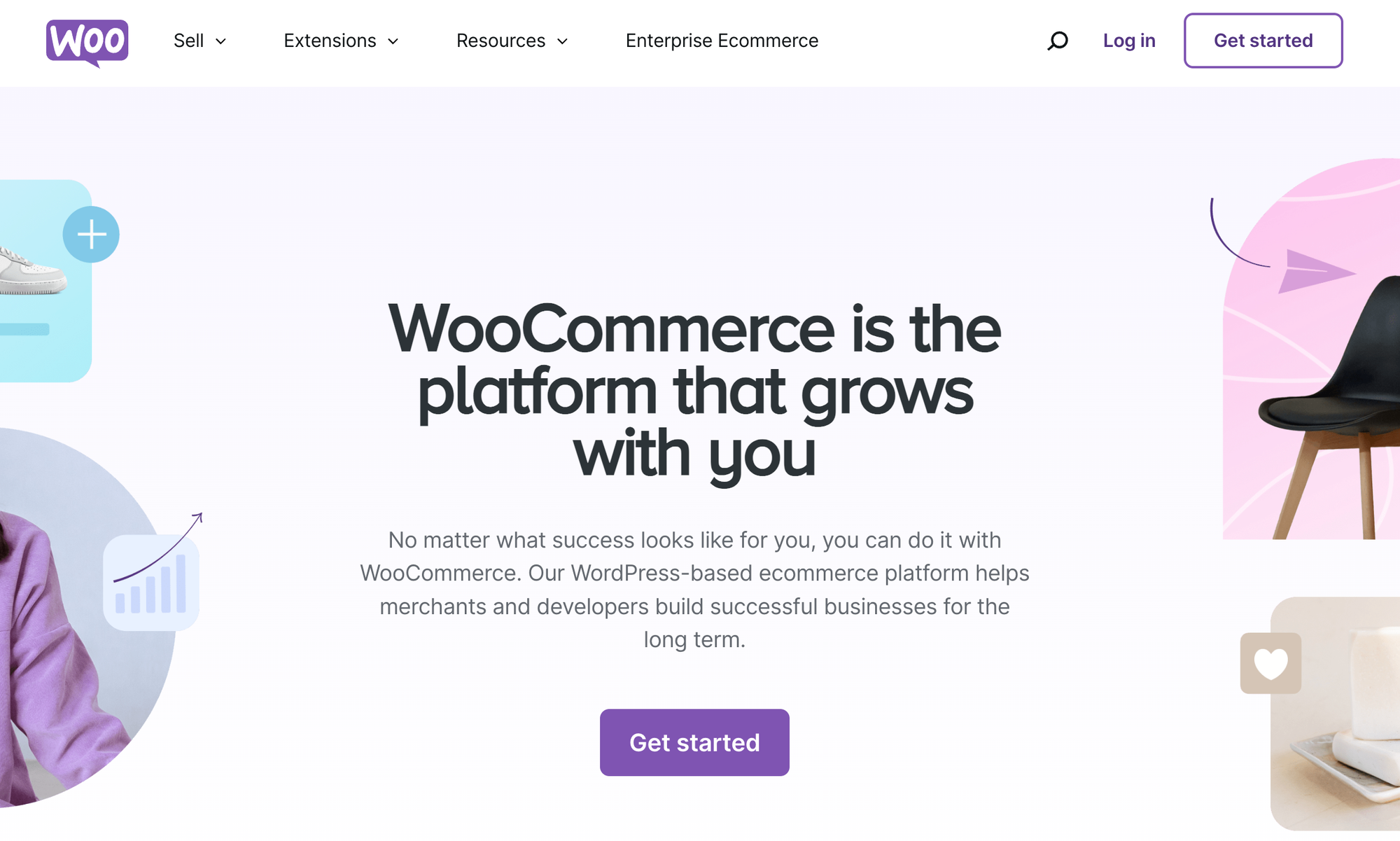
WooCommerce is the leading ecommerce platform, with around one-third of active online stores using it. WooCommerce itself is a plugin for WordPress. As you can imagine, customization and plugins are plentiful with this one, which is also the primary reason we included it here.
WooCommerce has tons of data integrations with all kinds of apps, as well as access to a wide range of WordPress plugins. So, you can seamlessly connect payment gateways to it, use its blogging features for SEO and inbound marketing, or play around with the thousands of plugins to add extra features to your store.
Since managing all these integrations and plugins will be difficult, WooCommerce is a better option if you have a team of developers supporting you. That said, the sheer customization and flexibility you get with the platform compared to other website builders is worth it.
Pricing: WooCommerce is free to install on WordPress. So, you’ll just have to pay for a domain and WP hosting, which will vary depending on how big your ecom store is.
3. Custom Cart

Now, you might have never heard of Custom Cart, especially if you started your ecommerce store in the last few years. But Custom Cart is the 3rd biggest ecommerce platform and has been around for nearly three decades.
Just like Shopify and WooCommerce, Custom Cart has tons of built-in tools. We’re talking inventory management, product reviews, SEO features, integration with every major payment gateway, the whole shebang. And while their website might be stuck in the early 2000s, their offerings are up there with most other modern website builders.
As for whether it’s the best option for you, it depends. If you have a US-based store, then it’s a great alternative to Shopify and WooCommerce. But, if you’re selling worldwide, go for another platform, as Custom Cart isn’t available outside the US.
Pricing: Custom Cart has 4 plans, all of which come with their set of features:
- CustomCart Standard Edition for $59/month
- Agenne ComboSuite or CommerceSuite for $89/month
- Agenne GiftSuite for $119/month
4. Wix
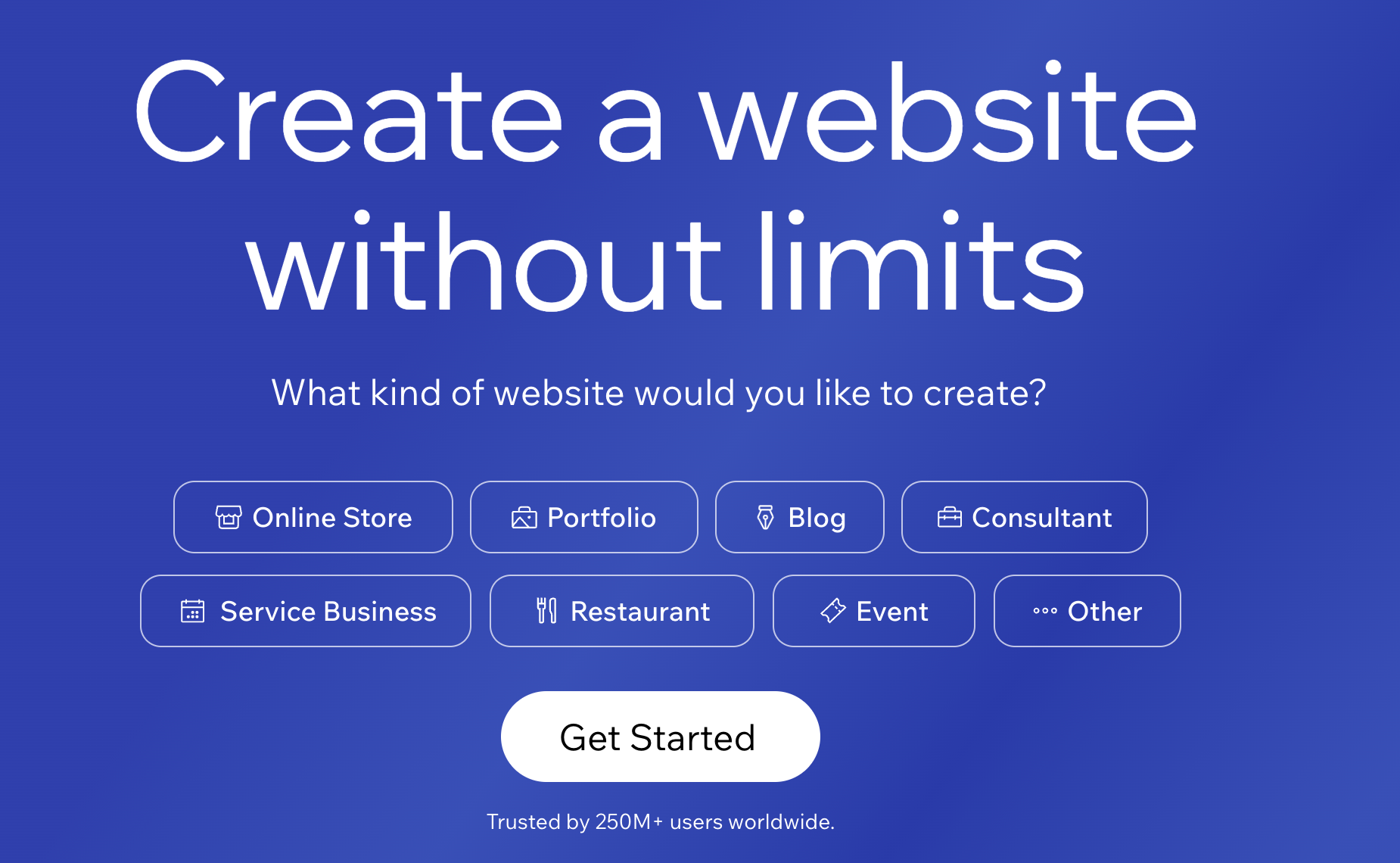
Wix is one of the best overall website builders, whether you’re running an ecommerce store, selling a membership, creating a blog, and everything in between. Everyone knows Wix for its drag-and-drop customization features. But, as an ecommerce platform, it’s much more than that.
For one, it has integrations with tons of different tools and a vast suite of its own in-built tools. Wix has everything you can imagine design-wise, but it also has plenty of marketing tools and integrations, as well as a wide range of ecommerce-specific automations.
Now, Wix is one of your best options if you’re running a small ecommerce store. Its integrations are enough to help you scale your business and grow your online presence without needing significant coding skills. But, as with most website builders, don’t expect full flexibility.
Pricing: Wix has 4 different pricing options. Each of these comes with a free custom domain for a year, 24/7 customer support, and no Wix branding. All plans are billed annually and come out to:
- Light for $16/month
- Core for $27/month
- Business for $32/month
- Business Elite for $159/month
4 Payment Gateways
Now, we get into the real ecommerce integrations, starting out with payment gateways. With these, you’ll guarantee that your customers can make online purchases safely and securely. Plus, the checkout experience will be smoother, as everything will be done directly on your website.
Of course, you aren’t required to use a payment gateway, and many ecom stores redirect customers to the payment processor they use during checkout. But, we believe it’s better to keep your customers on your site at all times to further optimize and scale the entire process.
1. 🏅Stripe

Stripe’s pretty well-known in the ecommerce space, as it’s been arguably the best payment service provider on the market. Security-wise, it’s easily one of the best, with Authorize.Net being marginally ahead. Besides that, Stripe can be integrated with all major ecommerce platforms very easily.
One of its key standout features is its API, which can greatly help your ecommerce store. If you’re a developer or have a team supporting you, Stripe's customizability in the checkout process doesn’t compare to any other payment gateway.
Speaking of Stripe’s API, we should mention how easy it is to integrate Stripe with Whop. All you have to do is set up Stripe and Whop accounts, as well as a subscription plan on Stripe’s dashboard.
Once that’s done, generate a set of API keys, which you’ll then input within Whop’s Dashboard when you set up your payment accounts. And that’s it! You’ll now be able to manage all your payments through Whop, with Stripe handling the back end.
Pricing: Stripe features a pay-as-you-go pricing system, charging a minimum 2.9% + 30¢ per online card transaction. You can contact their sales team for custom pricing if you run a large ecommerce store.
2. PayPal

PayPal is definitely up there with the best payment gateway integrations. Anyone who’s shopped online before and has been presented with either paying by card or PayPal will most likely choose PayPal. That’s primarily why you should utilize it! PayPal Checkout is always an option across online stores.
Plus, PayPal’s Buyer Protection gives you and your customers that extra bit of security. And, while it may not be as customizable as Stripe, it has just as much international presence and is very user-friendly. On top of that, PayPal’s integrated payment options, like QR codes and One Touch, are second to none on the market.
Pricing: Paypal charges a variable percentage and fixed fee per transaction depending on your location and the type of transaction (domestic or international). Domestic US transaction fees start at 2.29% + 49¢ (QR code payment), with PayPal Checkout going up to 3.49% + 49¢.
3. Square

Now, we get on to Square. Square isn’t only a payment gateway, as it offers a POS system, which is why we decided to include it here. In terms of integrating your online and offline sales, none can beat Square.
For one, it has integrations with many different platforms, tools, ecom sites. Also, since it’s more focused on offline sales, you’ll get some extra features, like inventory management, which is much more intuitive than what other payment gateways offer.
Pricing: Square has 3 pricing plans for its POS per transaction, according to the type of transaction:
- Physical (Card Present) transactions at 2.6% + 10¢
- Online (ecommerce) transactions at 2.9% + 30¢
- Manual (Keyed-In) transactions at 3.5% + 15¢
4. Authorize.Net
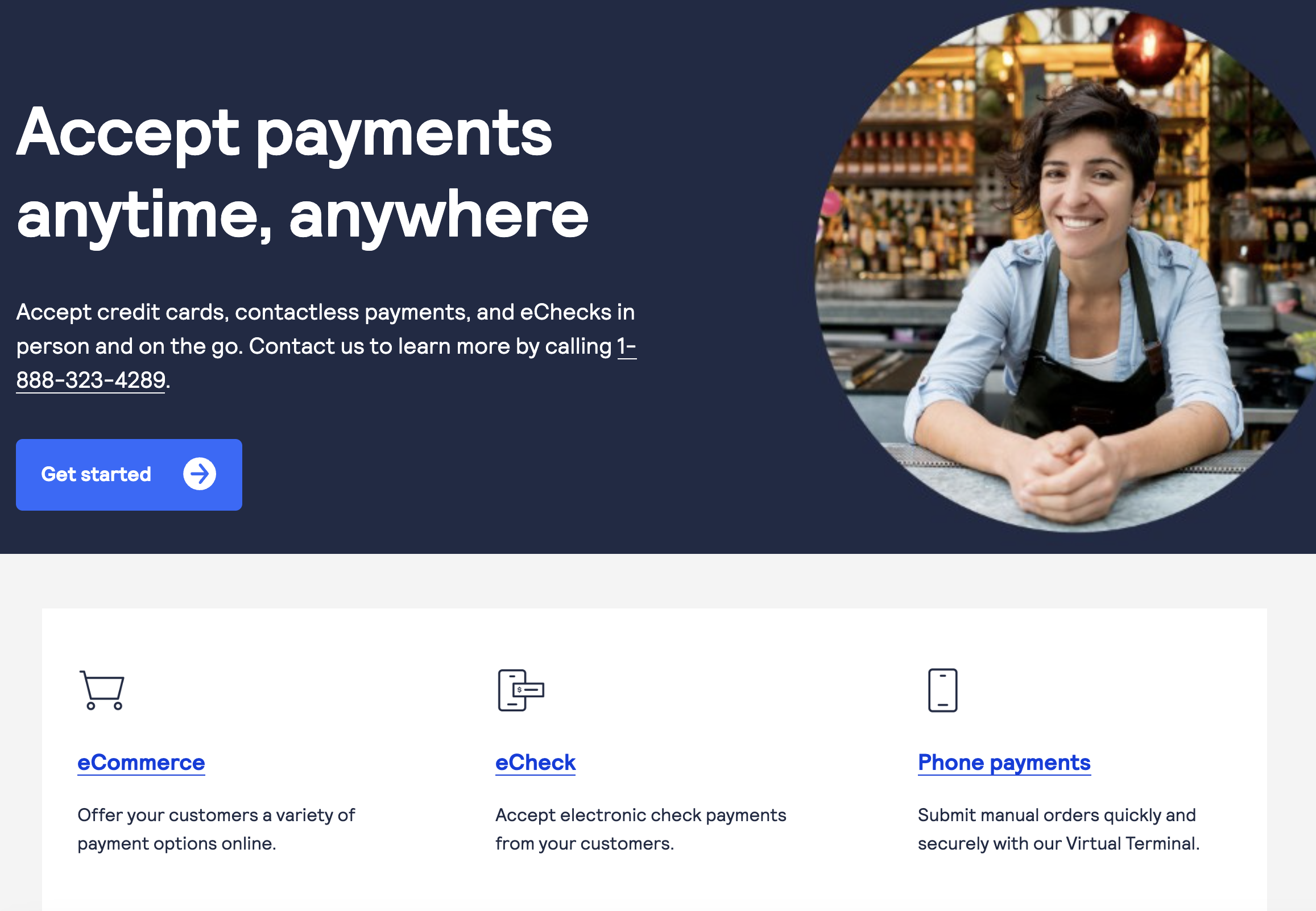
While PayPal and Square are more geared towards small stores or one-person ecommerce businesses, Authorize.Net targets established enterprises like Stripe. One of the things that makes it stand out is its top-notch security features and fraud detection, which is to be expected considering that it’s owned by Visa.
It can be integrated with most ecommerce platforms, including Shopify, as well as all the major accounting software. Thus, if your store deals with many large transactions every month, Authorize.Net is probably your best option!
Pricing: Authorize.Net has two different pricing plans, depending on whether you use it as a payment processor or just a payment gateway.
- All-in-one Payment Processor at $25 per month and 2.9%+ 30¢ per transaction
- Payment Gateway Only at $25 per month and 10¢ per transaction
4 Customer Support Integrations
Customer service and customer support go hand-in-hand. So, having a killer customer support integration, whether an AI chatbot, live chat, or just a helpdesk, is necessary to keep your customers happy.
It’s simple, really. Customers who interact with the support team are likelier to stay loyal to your online store when they need a product you sell. Plus, these integrations have many more features than just live chat support.
You see when you connect these with other CRM tools, you can automatically personalize your messages for each customer. In a sense, you're making the shopper feel valued, leading to less cart abandonment and more customer loyalty.
1. 🏅Zendesk

If you’re looking for an all-around customer support solution, then Zendesk is your best bet. While most similar integrations offer omnichannel support, none do it as well as Zendesk, which can help you unify all your communication across all channels with every customer under one software.
Obviously, Zendesk can be integrated with several other tools and has direct data integrations with most major ecommerce platforms, including Shopify. On top of that, it provides an overall advanced option that’s mostly targeted to big retailers and ecommerce stores. That, however, might be a little bit deterring if you’ve just opened your first online store.
Pricing: Zendesk has 5 different pricing plans that are charged monthly or yearly per agent. These are:
- Suite Team at $69/agent/month or $55/agent/month if paid yearly
- Suite Growth at $115/agent/month or $89/agent/month if paid yearly
- Suite Professional at $149/agent/month or $115/agent/month if paid yearly
- Suite Enterprise at $219/agent/month or $169/agent/month if paid yearly
- Suite Enterprise Plus at $249/agent (charged annually)
2. Freshdesk
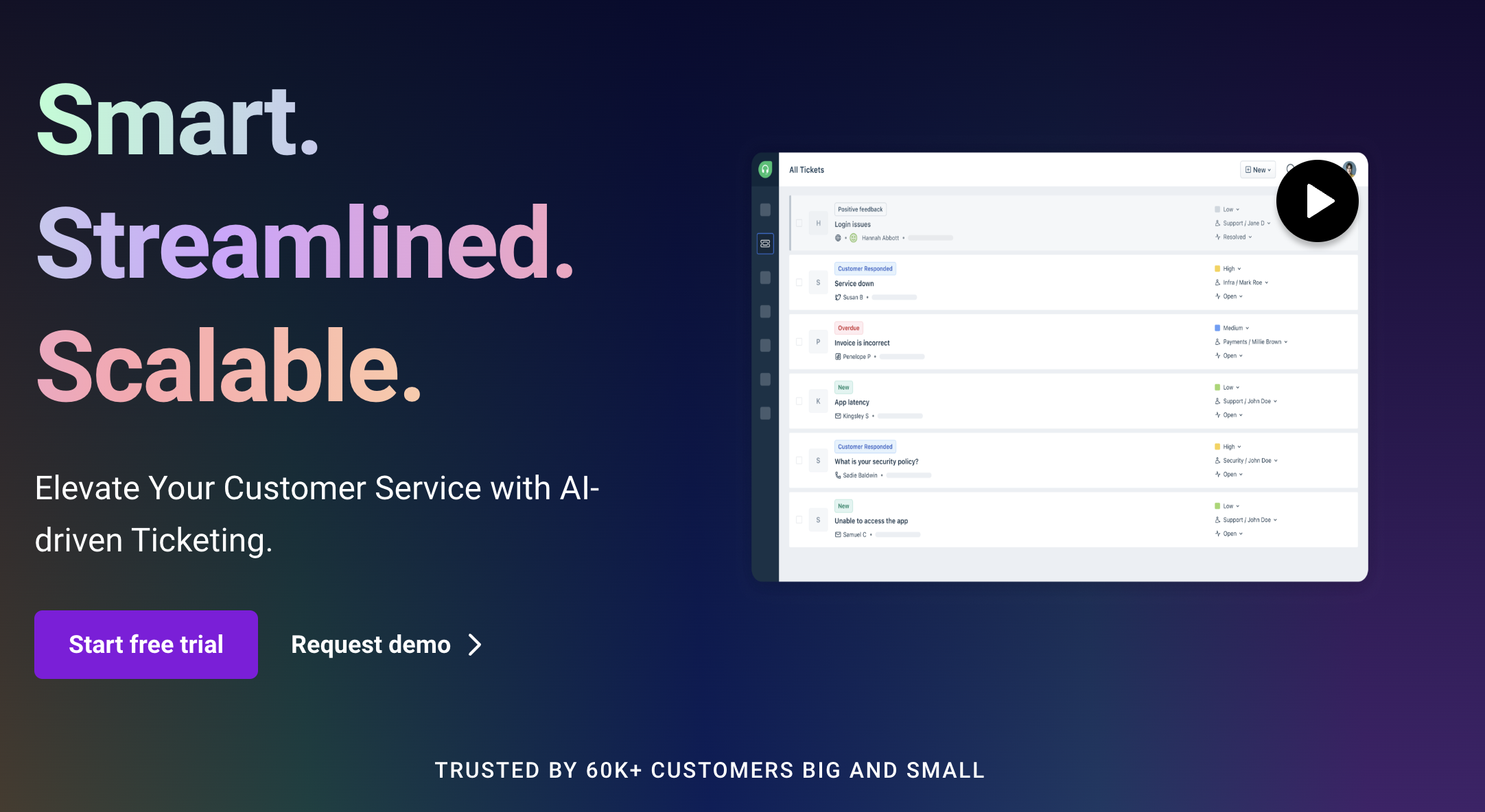
Freshdesk is the one to choose if you’re looking for a more user-friendly option. Despite not being as advanced as Zendesk, Freshdesk opts for a more agent-focused experience rather than a customer-based one.
This might sound counterintuitive, but hear us out. Freshdesk is as great as any other customer support integration, no doubt. The key is that they’ve gamified the process on the agents’ side, which will undoubtedly increase your team’s productivity and make work even more engaging for them. Like most other customer support tools, Freshdesk also offers omnichannel support and many integrations with the most popular platforms and software.
Pricing: The entire Freshdesk suite is sold in 3 different pricing plans, offered monthly and yearly. All plans come with a 14-day free trial. Here are the monthly plans:
- Growth for $35/agent/month
- Pro for $83/agent/month
- Enterprise for $131/agent/month
3. Intercom

With Zendesk targeting big ecommerce stores with advanced features and Freshdesk making things easier and more fun for the customer support team, Intercom comes in with a customer-centric focus. Indeed, when it comes to personalization and targeted chat support, Intercom is the best.
On top of this, Intercom has created a rather intuitive AI-based chatbot, which is one of the best in the market. And integration-wise, it has tons of different direct automation with several of the tools we’ve already mentioned, like Salesforce.
Pricing: Intercom has 3 simple pricing plans, with the first 2 having a 14-day free trial:
- Essential for $39/agent/month
- Advanced for $99/agent/month
- Expert for $139/agent/month
4. LiveChat

LiveChat is known for its… well, live chat. It’s in the name, after all. In all seriousness, LiveChat has perfected live communication with customers and is especially great for ecommerce stores. That’s because the tool notices how your customers interact with your website and engages with them during certain critical points.
That’s not all. In terms of the integrations it has with other tools, LiveChat is certainly one of the best. They have 200+ integrations, some of which include HubSpot, Shopify, and Mailchimp.
Pricing: LiveChat has 3 fixed pricing plans and one custom enterprise plan. The fixed plans can be billed annually and monthly, with the latter costing:
- Starter for $24/agent/month
- Team for $49/agent/month
- Business for $69/agent/month
5 Email Marketing Integrations
Moving along, we have email marketing integrations. If you’ve been running your store for some time now, you already know how much potential email has as a marketing and sales channel, so you should consider such an integration.
With these, you can do so much once you get your customers’ emails. Want to run a new email campaign? You already have a huge email list ready. How about promoting some limited edition products or asking your customers for feedback? It becomes effortless with a simple data integration.
1. 🏅Mailmodo
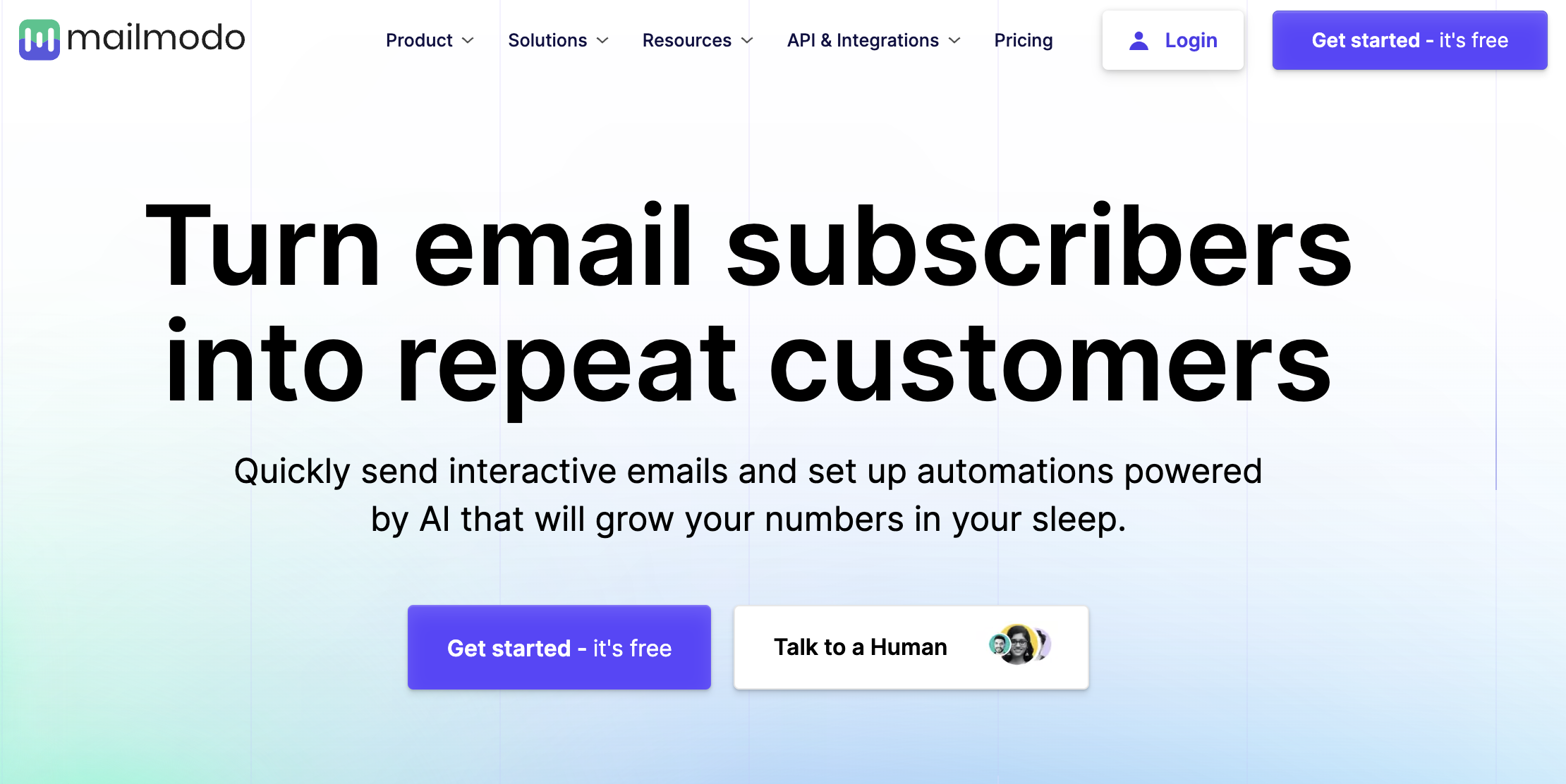
Mailmodo is one of the best options for email marketing, and it’s the one we use at Whop! Whether you’re running a new store, or have hundreds of thousands of contacts to reach out, Mailmodo has all the email templates, analytics, and contact management features you’ll need.
In terms of its native integrations, Mailmodo only has 21, which might seem too little. However, for one, it directly integrates with most of the CRM tools and website builders we’ve mentioned. Plus, it can be integrated with thousands of third-party integrations with other tools. So, when you consider that, as well as how easy it is to set up and use, Mailmodo is an amazing email marketing integration.
Pricing: Mailmodo has 3 pricing plans, with varying prices depending on how many contacts you have. That being said, Mailmodo is a proud member of Whop’s Marketplace, where they have 3 monthly plans:
- Whop Starter for $25/month (up to 500 contacts)
- Whop Essential for $49/month (up to 5,000 contacts)
- Whop Growth for $99/month (up to 40,000 contacts)
2. Mailchimp

Mailchimp is hands down the best option if your online store is new or you’re just dipping your toes in email marketing. It offers several email templates and drag-and-drop builders, similar to those of website builders and ecom platforms.
It’s particularly great for small businesses because it’s very easy to use compared to some of the other platforms. Integration-wise, Mailchimp will directly work with most major ecommerce platforms and several CRM tools, like Salesforce. Overall, it’s a good all-around option without having anything too fancy to boast about.
Pricing: Mailchimp has 4 pricing plans with variable rates depending on your contact list. The following prices are for the minimum number of contacts (500):
- Free (only available for 500 contacts)
- Essentials at $13 per month (up to $385/month for 50,000 contacts)
- Standard at $20 per month (up to $800/month for 100,000 contacts)
- Premium at $350 per month (up to $1600/month for 200,000 contacts; custom pricing for 250,000+ contacts)
3. Klaviyo

If you’re running one or multiple large ecommerce stores, there’s really no better choice than Klaviyo. Compared to most other email marketing integrations, Klaviyo offers tons more segmentation and data. In turn, this means that you can set up automated flows and actions throughout the customer journey, each targeting a specific audience.
Simply put, Klaviyo is pretty advanced, which might make it a bit overwhelming to use if you’re only running a small store. For enterprise-level businesses, though, it’s amongst the best tools you can use. Plus, it comes with direct integrations for hundreds of apps and tools, making it a fantastic ecommerce integration.
Pricing: Klaviyo has 3 plans in total. The price point varies depending on how many contacts you have:
- Free plan for 0-250 contacts
- Email starting at $20 per month for 251-500 contacts (up to $2300/month for 250,000 contacts max; custom pricing for 250,001+ contacts)
- Email and SMS starting at $20 per month for 251-500 contacts and 150 SMS credits
4. ConvertKit
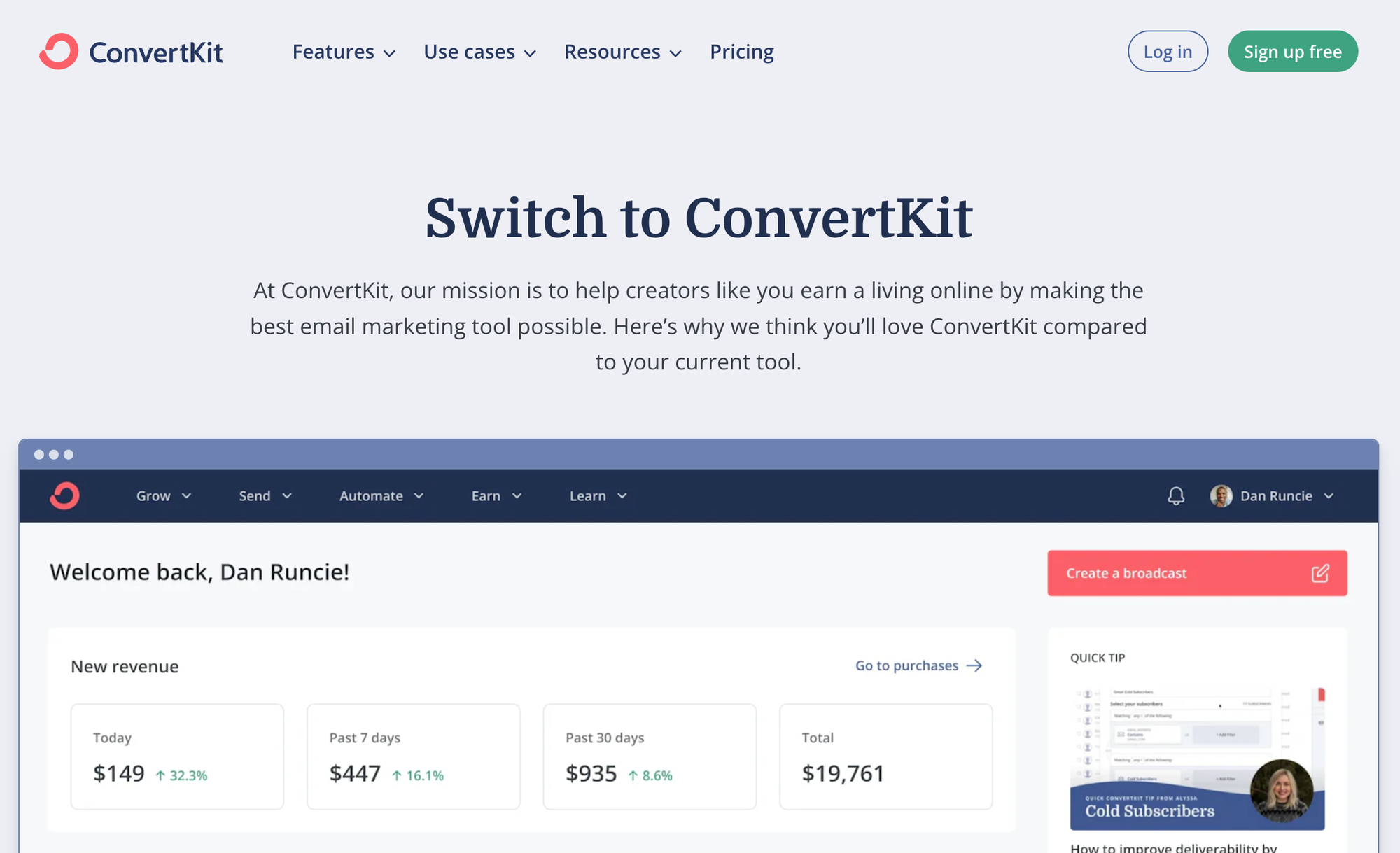
Now, if you’re a creator running an online store, ConvertKit will help you grow your ecommerce business and your personal brand. This platform directly targets creators, helping them manage and grow their audience, as well as providing a great email marketing integration for their ecommerce store.
Also, ConvertKit directly integrates with most ecommerce platforms, like Shopify, and online coaching platforms, like Mighty Networks. It has additional integrations with various tools, from CRM platforms to tracking and analytics apps.
Pricing: ConvertKit has 3 pricing monthly and yearly (2 months free) pricing plans:
- Free plan for up to 1,000 email subscribers
- Creator starting at $15 per month for up to 300 subscribers ($2299/month for up to 400,000 contacts)
- Creator Pro starting at $29 per month for up to 300 subscribers ($2599/month for up to 400,000 contacts)
5. Drip
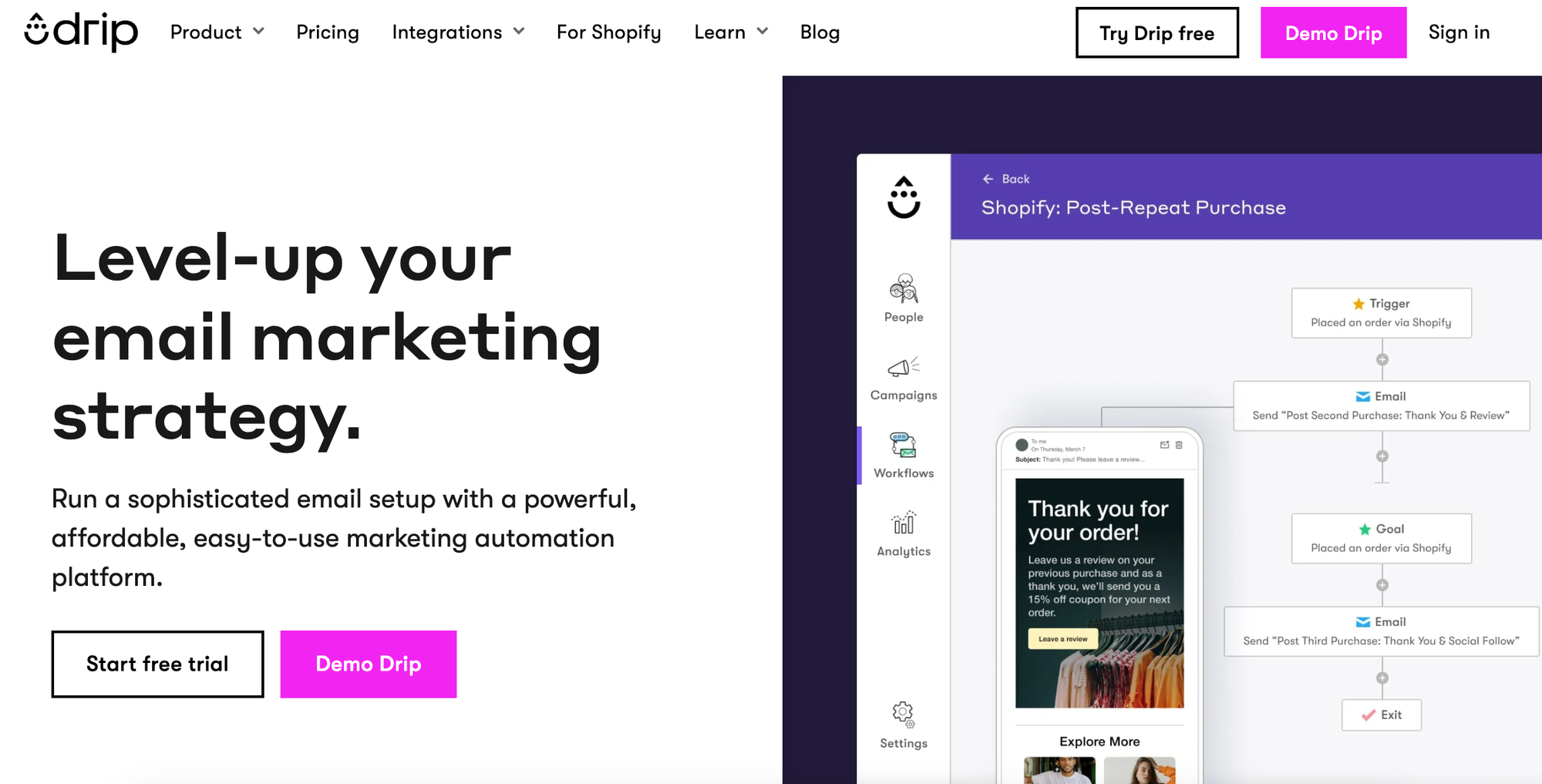
When it comes to Drip, it basically takes many of the benefits of all the other email marketing tools and jams them into one. It offers great segmentation features, which are further backed up by its embedded CRM software. In turn, you’ll be able to “sell” throughout the entire customer journey.
Thus, Drip is a tad bit more advanced than most other tools in terms of personalizing your emails and communicating with your customers. On top of this, Drip has more than 100 integrations with different tools and platforms, including a dedicated one for Shopify!
Pricing: Drip comes with a single pricing plan and a 14-day trial. Prices start at $39 per month for up to 2500 subscribers and go up to $1899/month for up to 170,000 contacts. You’ll need to contact sales for anything above that.
5 CRM Tools
We’ve already said a lot about CRM tools and integrations, but what do they really do? Where do these actually help you, and why do we consider them a great ecommerce integration?
Well, for one, CRM integrations collect all client data and keep track of your customers' interactions with your website. And, in ecommerce, data is king. With all this info, you’ll be able to optimize your store.
But that’s not all. The key thing about CRM tools is that they can be connected with other integrations, helping you create a personalized experience for every customer, be that customer service or marketing.
1. 🏅Whop Dashboard
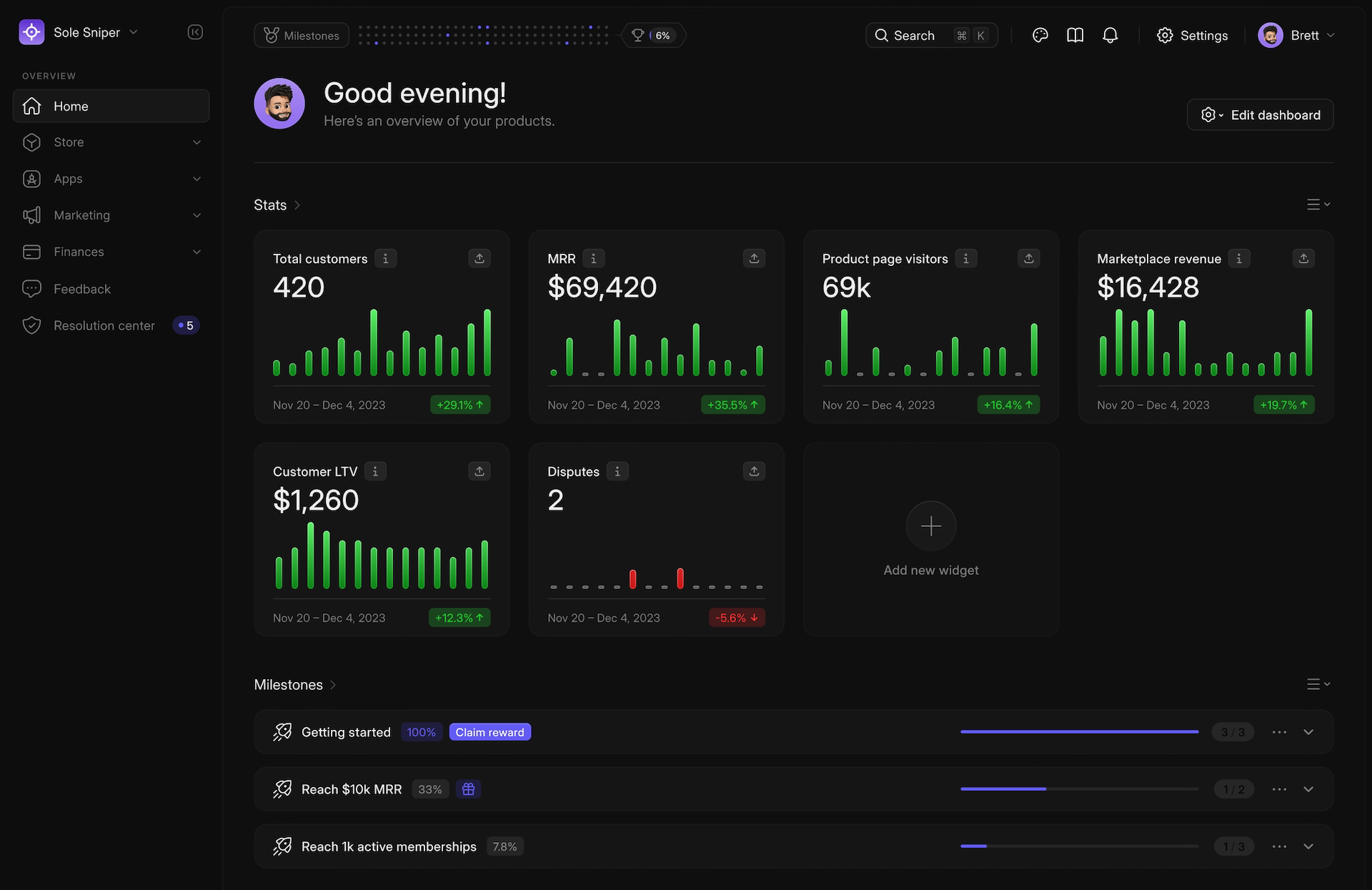
We don’t like to brag, but our Dashboard, accompanied by our Hub, is the best CRM tool for online stores. There are dedicated tabs for every feature and metric you need to track. With Whop's Apps, you can gather customer data, manage your affiliates and subscriptions, get feedback and reviews from your customers, and so much more.
With the help of our App Store and Hub, you’ll also not have to get many integrations, as they make our Dashboard an all-in-one solution (more on that later). Still, Whop’s Dashboard has some third-party integrations with Stripe and PayPal, as well as Coinbase for crypto payments.
Pricing: If you create your online store on Whop, the Dashboard is included in the applicable fees. Whop only charges an industry-leading 3% per transaction, regardless of how little or how much you earn. So, the Dashboard is practically free!
2. HubSpot

Out of all the CRMs on the market, HubSpot is definitely the most well-known one. This is particularly significant if you want to drive traffic to your online store through content marketing and other inbound methods. In fact, HubSpot has, more or less, set the standard for content marketing.
Besides that, HubSpot has plenty of integrations with most of the tools we’ve mentioned on this list. On top of all this, it’s very easy to use compared to some enterprise-level CRMs.
Pricing: HubSpot CRM has 3 pricing plans, which can be billed annually or monthly. The monthly plans are as follows:
- Starter for $20/month
- Professional for $1200/month
- Enterprise for $4000/month
3. Salesforce

If you’re running a big retailer, you’re probably already using Salesforce. If you’re not, you should definitely give it a try. This CRM has its own app ecosystem, which will help your ecommerce store grow without needing many other integrations.
However, Salesforce truly excels at simplifying the complex tasks that come with large online stores and enterprises. Thus, if you’re just starting out, go for more user-friendly options like Zoho or HubSpot. However, if you want a fully customizable CRM that you can use at an enterprise-level store, there’s really no better option than Salesforce.
Pricing: Salesforce has a huge number of pricing plans depending on what CRM you opt for. Since we want to focus on the Sales CRM, here are the 5 monthly, per user, plans:
- Starter for $25 per month
- Professional for $75 per month
- Enterprise for $150 per month
- Unlimited for $330 per month
- Einstein 1 for $500 per month
4. Zoho

Zoho is a great alternative to HubSpot, with both CRMs being pretty similar in what they offer and how much they cost. Zoho is arguably a bit more in-depth, offering a pretty big suite of extra tools that can assist you in scaling your store.
With that said, Zoho has plenty of integrations with third-party apps and works well with most ecommerce platforms. So, if you’re looking for something between HubSpot and Salesforce in terms of functionalities and user-friendliness, Zoho CRM is your best bet.
Pricing: Zoho CRM has 4 pricing plans charged monthly. Here are the prices in Euros and USD:
- Standard for €20 ($21.5)/user/month
- Professional for €35 ($37.5)/user/month
- Enterprise for €50 ($53.5)/user/month
- Ultimate for €65 ($70)/user/month
5. Microsoft Dynamics 365

Dynamics 365 by Microsoft is your best option if you’re already using tools from Microsoft’s suite, such as Office, Teams, etc. Features-wise, it’s pretty similar to Salesforce in that it’s very intuitive and targeted toward large online stores and enterprises.
However, Dynamics 365 stands out for its integration with the rest of Microsoft’s suite to create an entire ecosystem of apps through one unified platform. Thus, if you want to increase your team’s productivity and are running a rather large ecommerce store, Dynamics 365 is an amazing option.
Pricing: Microsoft Dynamics 365 has plenty of pricing plans for all the different suite features. Focusing on the sales side of things, here are the 4 sales pricing plans:
- Sales Professional for $65/user/month
- Sales Enterprise for $95/user/month
- Sales Premium for $135/user/month
- Microsoft Relationship Sales starting at $162/user/month
5 Shipping/Fulfillment Integrations
When you start selling large volumes of products, shipping can really make or break your ecommerce store. A poor shipping experience will decide whether you can turn a customer into a repeat buyer.
Thus, if you’re offering global shipping on your products, a shipping integration is necessary. These work just like fulfillment services in that they take care of the whole process from the moment a customer’s order is processed to when it reaches their door.
1. 🏅ShipNetwork
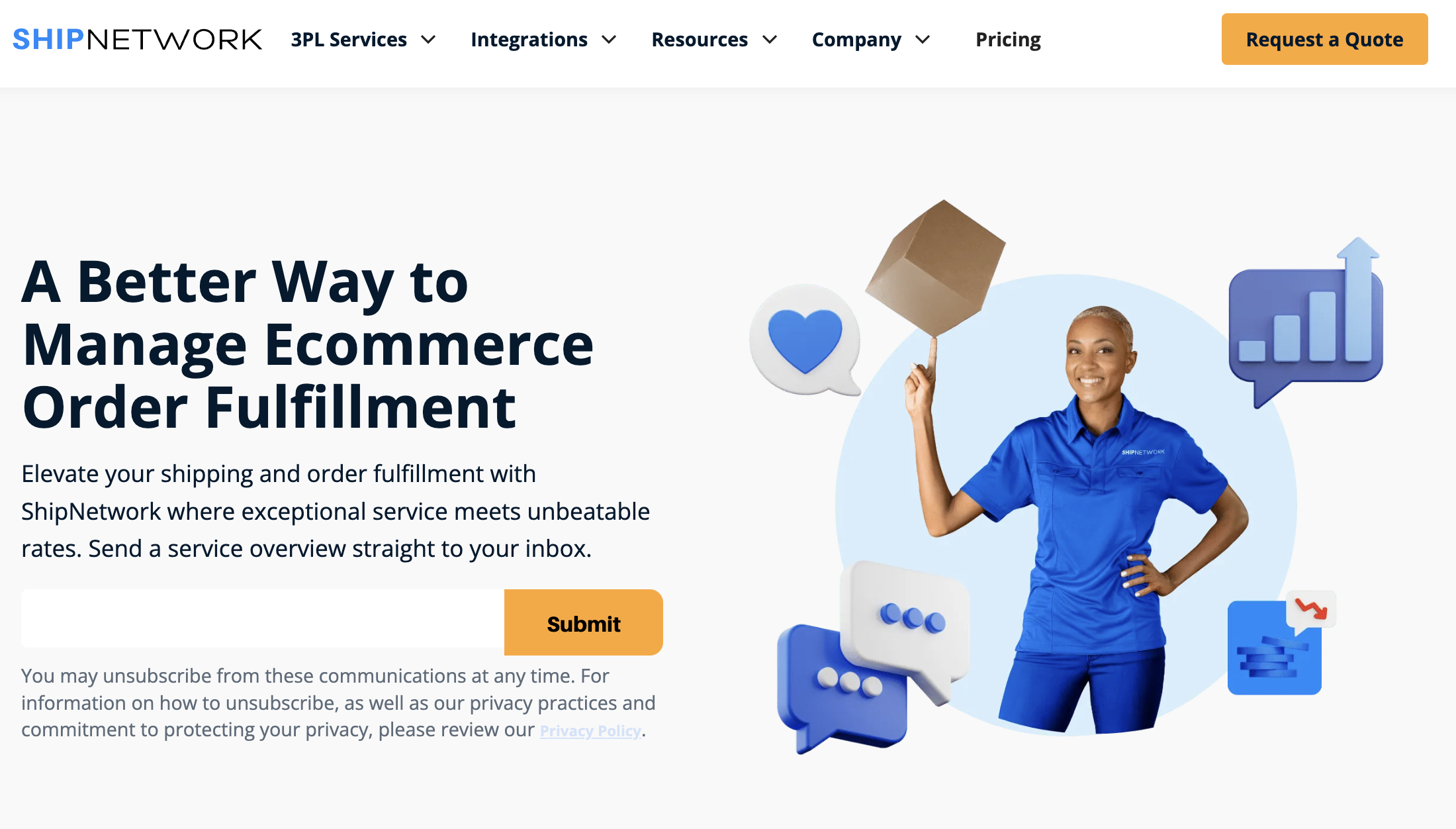
When it comes to efficiently scaling your shipping operations for your ecommerce businesses, ShipNetwork is the way to go. Formerly known as ShipStation, this shipping platform is particularly suitable for businesses experiencing rapid growth or significant fluctuations in order volume.
Also, its extensive network of warehouses across the US significantly reduces shipping times and costs. This makes it a top option for those aiming to offer fast delivery as a competitive advantage.
Pricing: ShipNetwork provides tailored pricing structures depending on the volume and type of product, covering charges for receiving, storage, picking, and packing. Nevertheless, the pricing details are not openly disclosed, so you must contact ShipNetwork directly to obtain a specific quote.
2. Shippo
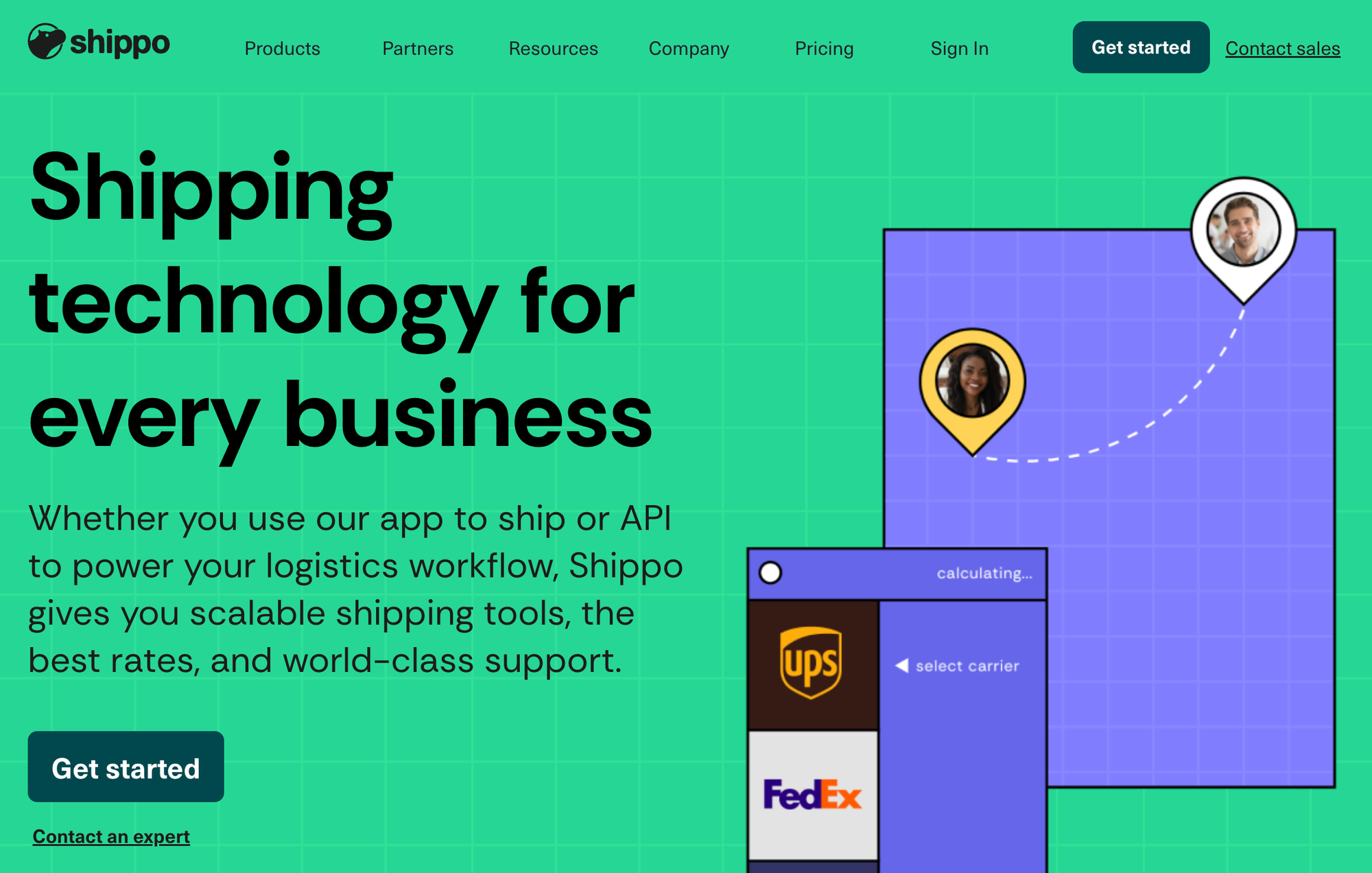
Shippo is a great option if you’re scaling your store and receiving huge orders you can’t handle alone. Its platform integrates with multiple ecommerce tools, allowing for easy connection and synchronization of shipping processes.
But, the main thing that makes Shippo is its variety of carrier options. Basically, the platform will present you with the rates that different carriers offer and help you find the best one. That’s something that no other shipping integration can do! This will also help you improve your logistical efficiency and reduce overall shipping costs.
Pricing: Shippo has 3 different pricing tiers, depending on your monthly shipments:
- Free for up to 30 shipments
- Professional at $19/month for 31+ shipments
- Premier at custom pricing for unlimited shipments
3. ShipBob
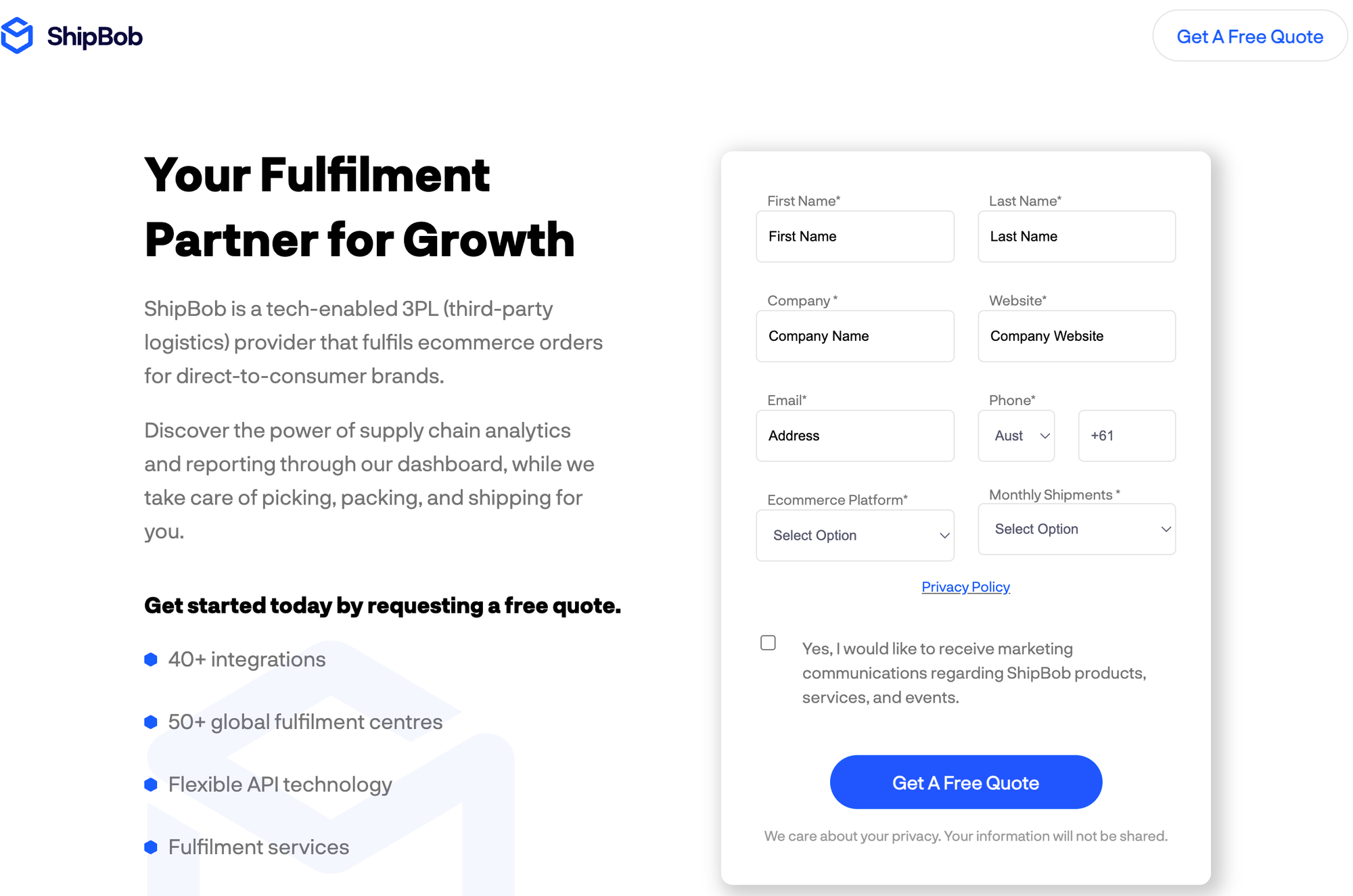
Designed for ecommerce businesses prioritizing fast and reliable fulfillment, ShipBob excels by integrating directly with most major ecommerce platforms. It particularly targets direct-to-consumer (DTC) ecom stores offering an end-to-end solution.
This means that you’ll get plenty of features that aren’t as in-depth in other integrations, like real-time inventory management and distributed inventory capabilities. In turn, ShipBob is the perfect option if you have a mid-sized store and are looking to expand nationally or internationally.
Pricing: ShipBob offers rather intuitive pricing depending on the type of products you sell:
- Storage fees from $5 to $40, applicable from a bin size of 21 x 7 x 11 inches up to a pallet size of 48 x 40 x 54 inches.
- Receiving fees are $35 per hour for the first two hours and $40 per hour after that.
- Picking fees waived for the first four orders, with a subsequent charge of $0.26/unit.
4. Amazon FBA
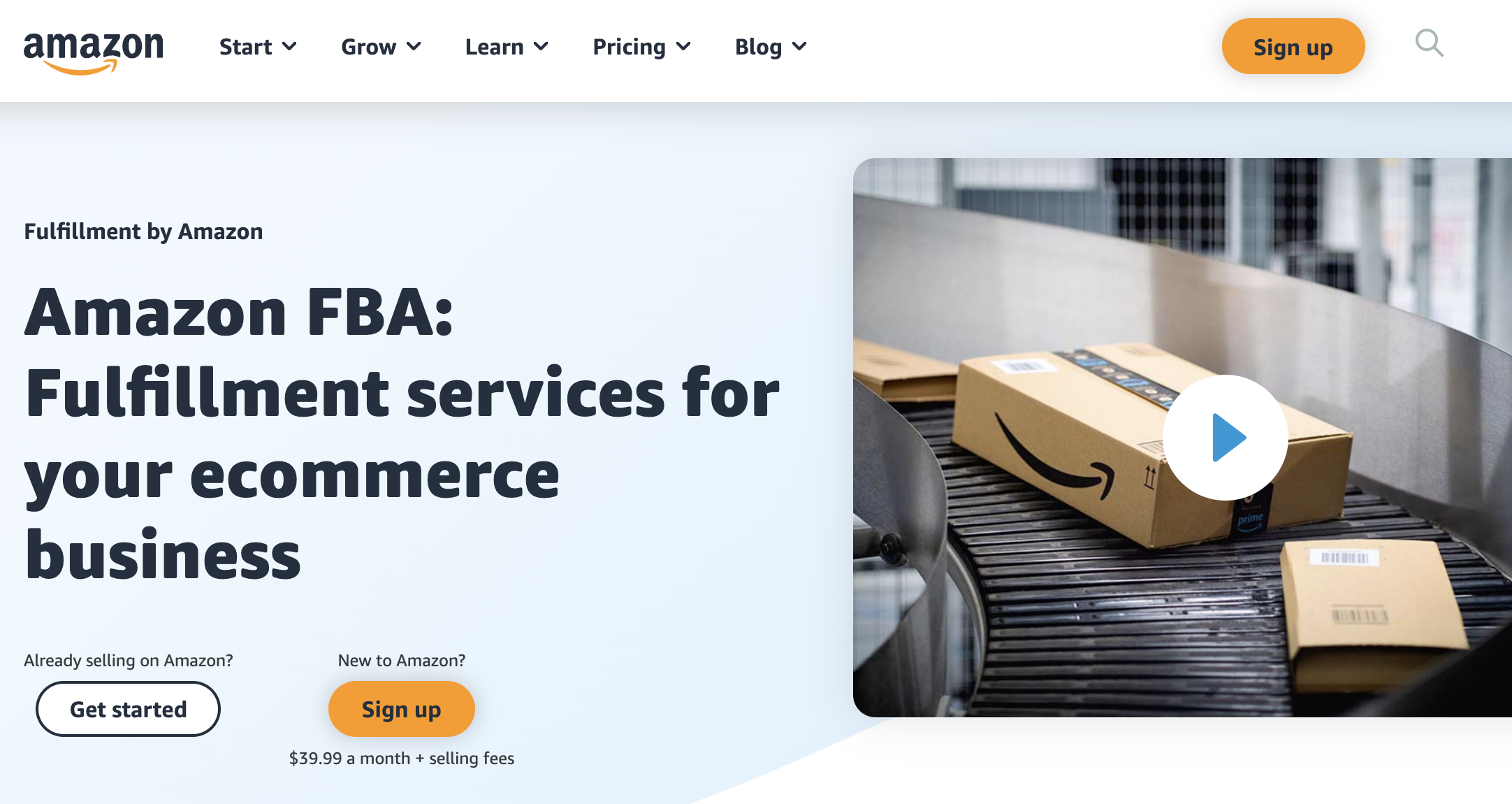
Amazon FBA is really your best option if you have a smaller online store that you’re looking to scale quickly. Being on FBA means being part of the Amazon marketplace, which, in turn, comes with the company’s top-notch logistics network. And, of course, let’s not forget about Amazon Prime.
If you gain Prime eligibility, you’ll get tons of product visibility and appeal to Prime members. That’s just something you don’t get with any other shipping integration. And, while FBA comes at a higher cost, it can definitely be worth it when you’re looking to scale fast.
Pricing: Amazon FBA is known for its relatively high fees, which can significantly reduce profits, especially for products with slim profit margins. The fee structure of FBA is also complex and rather challenging to navigate.
The fees associated with Amazon FBA include:
- Monthly fee of $39.99 for a professional account eligible for FBA services.
- Referral fee from 6% to 20%, depending on the category of the product, with a minimum charge of $0.30.
- Storage fees from $0.56 to $2.40 per cubic foot, influenced by the size of the product and seasonal factors.
- Fulfillment fees for individual products from $3.06 to over $195 for oversized items.
5. Red Stag
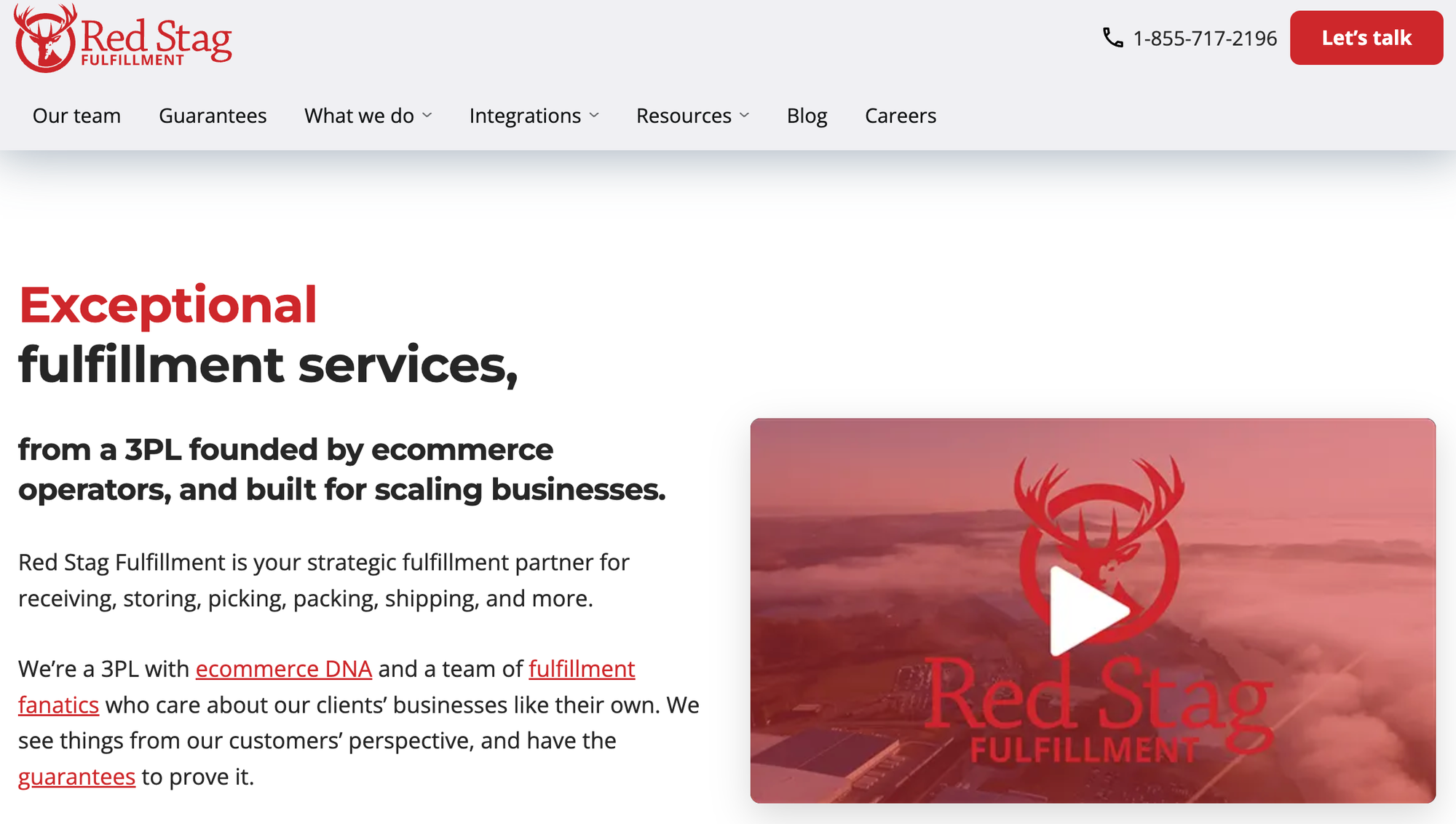
Red Stag stands out in the fulfillment market, especially for businesses dealing with heavy, large, or high-value products. With a focus on precision and speed and a commitment to zero shrinkage, Red Stag is particularly beneficial for ecommerce sectors like electronics, furniture, and fitness equipment.
Their readiness to compensate for mistakes and tailored fulfillment solutions, including kitting and subscription boxes, make them a reliable partner for complex shipping needs.
Pricing: Red Stag's pricing model consists of the following:
- One-time Set-Up Fee of $100
- Receiving Fees of $2/bin and $15/pallet
- A Picking Fee of $0.30/order
How to Find the Best Ecommerce Integrations for Your Business
To find the best ecommerce integrations for your business, you’ll need to identify your store’s current needs, how much true value each integration will bring, and how easy it is to connect these with your platform. You’ll also need to find the right ecommerce platform with many integrations, especially the specific integrations you want.
Finding Your Online Store’s Needs
Identifying your store’s needs can be pretty simple if you have a roadmap or a set of goals in mind. If you want to grow your reach and get more traffic on your platform, you should use marketing integration, be it social media or email marketing. Plus, you can use a CRM like HubSpot, which will help you get a larger audience through content.
Value vs. Cost
Depending on your situation, you’ll have to identify when an integration is valuable and when it’s costly. Splurging a huge amount of capital (or losing a huge piece of your profit margin) on shipment integrations when you’re only starting out won’t provide the equivalent value. However, if you spend the same amount on email marketing, you’ll get tangible results and value from the get-go.
Ease of Installation
This one’s pretty straightforward; you should only choose integrations that directly connect with your ecommerce platform. Unless you’re a developer who can use the APIs of each tool to integrate them within your platform, the whole process will cost you a lot of time.
Finding the Platform With the Integrations You Want
A platform with all the integrations you had in mind embedded within it is a goldmine. To us, that goldmine is Whop.
Don’t want to deal with navigating through CRMs to get the data you need? Whop has a built-in dashboard that’s extremely simple to use, with each tab having all the necessary data you’re looking for. What about managing your marketing and finances? Yep, Whop has specific tabs for both of these!
On top of these, Whop has its very own tool to handle payouts, aptly named Whop Payments, alongside integrations with Stripe, PayPal, and Coinbase. Thus, finding a platform with all these integrations built in will make things much, much easier.
Scale Your Ecommerce Business with Whop!
At the end of the day, finding the best ecommerce integrations for your online business comes down to what you believe your business needs at that specific point. Some integrations, like shipping and fulfillment, can be valuable if you sell physical products en masse.
But, what if you’re only selling digital products and services? In that case, you’ll need to find a platform that has all the necessary tools and integrations to help you focus on perfecting your product. You’ll need a platform, like Whop!
As a digital product marketplace at heart, Whop has everything you’ll need. Thousands of online creators like you trust Whop and have successfully made $300,000,000+ in total sales. Why is that?
Whop is the only platform with all the ecommerce integrations you need in one place for only a fixed 3% transaction fee.
With Whop, you can:
- Create your own hub to house all of your products, from ebooks, to gated community access, to SaaS, pdfs, live coaching, masterminds, paid newsletters, and more
- Market it directly on the Marketplace to a huge audience.
- When you’re ready to receive your first payment, Whop Payments will act as your MoR and payment processor, so you won’t need to get any external payment gateway integrations.
What about email marketing and a CRM solution? As we mentioned above, Whop offers a native integration with Mailmodo, and its Dashboard is an incredible CRM tool with all the data you need to track.
On top of that, Whop covers ecom fulfillment, and our customer support isn’t only available 24/7 for you and your customers, but it’ll also answer any questions within minutes!
So, are you ready to create your very own whop? Are you ready to use some of the best ecommerce integrations, all within one platform? Then, create an account on Whop and have your online store ready within a few minutes. Sign up as a Whop seller today!




